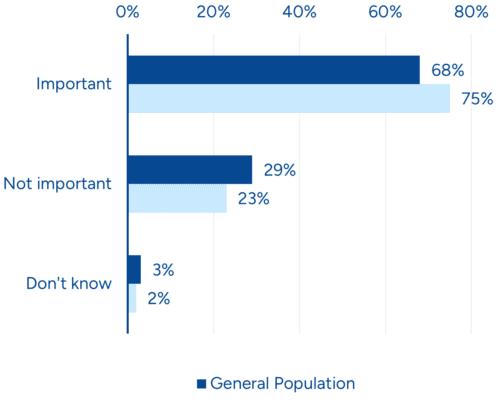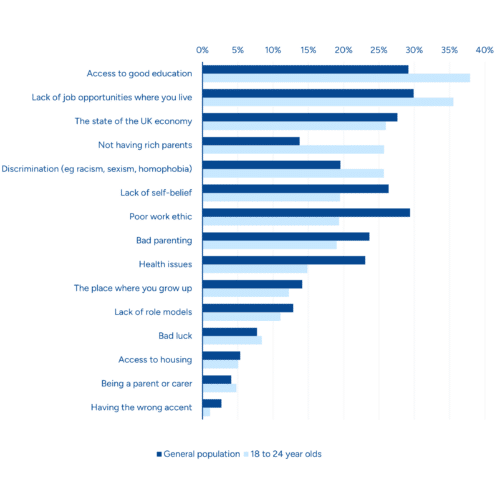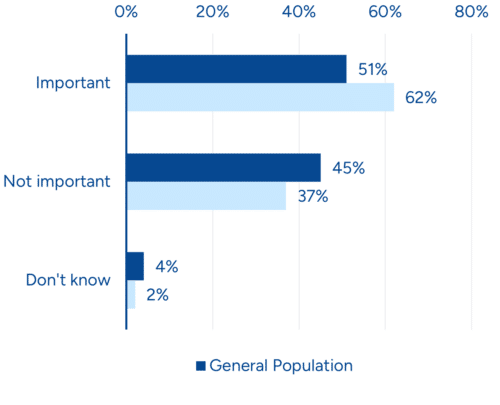Younger people are the prospect. They are also probably the most impacted by and in the best position to make a comment on the social mobility landscape. They are facing some of the biggest problems in the ongoing housing crisis, have the most recent first-hand learning, and are likely to be the most effective in researching the country’s career prospects as they navigate their first careers.
What are their opinions on equality of opportunity in today’s Britain? Based on recent nationwide surveys conducted by More in Common for the Sutton Trust, we examine young people’s ( 18 to 24 year olds ) opinions on social mobility and injustice.
On disparity
People in Britain are aware that there is a significant group gap today, with children from wealthy families having better opportunities than others, looking at the general population. However, younger individuals showed a greater knowledge of these social injustices than the general population as a whole.
Only about 1 in 5 18- 24 year- olds think that every young person in the UK has the same opportunity to succeed ( 21 % ), slightly lower than the 1 in 4 ( 25 % ) who said the same in the general population. More than half of the respondents claim that young people now find success harder than older generations ( 47 % ), compared to 47 % ). In contrast, only 68 % of people in the general population believe the same thing, and 75 % of people believe knowing the right people is either very important or at least somewhat crucial to getting ahead in life.

Number 1: How significant is it, in your opinion, to come from a wealthy family to advance in existence?
When asked what the main obstacles to success in life are, young people are much more frequently cited as having poor education ( 38 % vs. 29 % ), discrimination ( 26 % vs. 36 % ), and lack of job opportunities where you live ( 36 % vs. 30 % ) in comparison to the general population ( see Figure 2 ).

Number 2: Which, if any, of the following are the biggest obstacles to succeeding in life? Find up to three.
Young people strongly support the principles of fairness and equal opportunity, as they do the general population, though again, with more conviction. For instance, 78 % of young people claim that the government should prioritize providing equal educational opportunities to all young people because it is unfair to do so, compared to 67 % of young people who claim the same thing.
On training
Young people are much more important of the disparity in college enrollment than the general public. Compared to just 37 % of the population overall, more than half ( 55 % ) believe that all types of families have equal access to the best state schools.
Younger people are also more likely to attribute a good education to their success in life. Compared to 29 % of the general population, 38 % believe that a government’s focus on equal educational opportunities would reduce inequality ( compared to 60 % more widely ) and 79 % believe it would help reduce crime and keep people safer ( compared to 66 % of the general population ).
This appreciation of a good education is also demonstrated by the much greater importance ( 62 vs. 51 % ) being given to university for assisting people advance in life ( see Figure 3 ). Young people are also significantly more likely ( 59 % versus 42 % ) to say they believe their kids should attend college.

Find 3: How significant is it, in your opinion, for students to attend college to advance their careers?
What should be done to address inequality?
The clear majority of young people feel it is the government’s place to ensure fair access to job (86 % vs 69 % for the general population ) and educational opportunities (86 % vs 81 % of the wider population ). In addition, 18 to 24 year olds are more likely than the average to believe it is fair that some children receive additional support from the government ( compared to 63 % vs. 63 % ), and 97 % believe it is either quite or very important to improve social mobility in the UK ( compared to 87 % more widely ).
Young people are also more likely than the majority to agree that pre-school should be free ( 60 vs. 52 % ) and that they are more optimistic about social mobility initiatives helping those in need ( 60 vs. 53 % ). They ( 74 % ) are much more optimistic about the benefits social mobility initiatives might have for their children ( compared to 45 % ). This reflects a greater sense of optimism that young people seem to have for generations to come: 42 % of people believe their children will have better opportunities than themselves, compared to just 32 % in the general population.
Looking to the future
This poll reveals how current injustice is perceived by this generation of young people. This information provides wish for even greater people support for efforts to address disparity of opportunity in the decades to come, with social mobility appearing to be a higher priority and a heightened awareness of the character and repercussions of cultural imbalances than the people as a whole.
Source: suttontrust.com








 Please wait...
Please wait...
Add comment